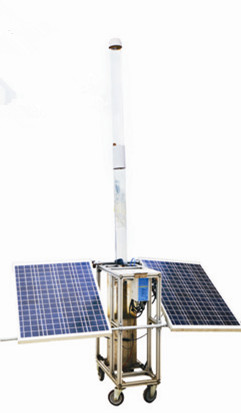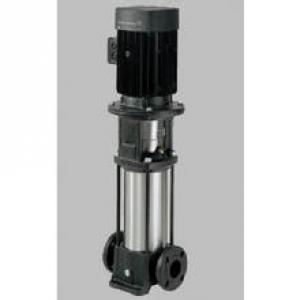1 Hp Solar Pump 3ds-4
- Loading Port:
- China Main Port
- Payment Terms:
- TT OR LC
- Min Order Qty:
- -
- Supply Capability:
- 300 sets set/month
OKorder Service Pledge
OKorder Financial Service
You Might Also Like
Product description:
Product: Solar water pump
Model:3DS-4

Appilication:
submersible pump
for deep well near a house
for drinking water of one family (3-4 people)
for watering a small garden
Product specification:
flow rate:300 liter/ hour, 2m3/day.
lift: 10m-100m
pump diameter: 94mm
well diameter more than 102mm
with BLDC motor, motor power:360W
but only need solar power:100W, our pump can save more than 50% solar panel power.
Material:
Pump inside: stainless steel and wearable nylon,it enables our solar pump to have 10 years sevice life.
Motor length:20cm,70% shorter than other motors. So that you can pump 70% more water by our solar pump.
Certification:
3 International patent
ISO9001
CE
Warranty:2 years
- Q: Can a solar pump be used in areas with limited access to water demand?
- Yes, a solar pump can be used in areas with limited access to water demand. Solar pumps are ideal for such areas as they operate using renewable energy from the sun, eliminating the need for grid electricity or fuel. They can be used to extract water from wells, boreholes, or even rivers, providing a reliable and sustainable water supply for various purposes such as irrigation, livestock, or domestic use. The versatility and efficiency of solar pumps make them a suitable solution for areas with limited water access.
- Q: How does a solar pump handle water with high levels of ammonia or other pollutants?
- A solar pump can handle water with high levels of ammonia or other pollutants by incorporating a filtration system. This system helps remove or reduce the concentration of pollutants present in the water before it is pumped. The filtration process may involve various techniques such as activated carbon filters, reverse osmosis membranes, or other specialized methods depending on the specific pollutants. By effectively filtering the water, a solar pump ensures the delivery of cleaner and safer water for various purposes.
- Q: Can a solar pump be used in swimming pools?
- Yes, a solar pump can be used in swimming pools. Solar pumps are not only energy efficient but also eco-friendly, making them a popular choice for pool owners. They harness energy from the sun to circulate and filter the pool water, reducing electricity costs and environmental impact.
- Q: Can a solar pump be used to create a water fountain?
- Yes, a solar pump can be used to create a water fountain. Solar pumps are designed to operate using solar energy, so they can be used to power a water fountain without the need for electricity. By connecting the solar pump to a fountain nozzle or other water feature, it can circulate water and create a visually appealing fountain display.
- Q: What is the minimum solar panel capacity required for a solar pump?
- The minimum solar panel capacity required for a solar pump depends on various factors such as the size of the pump, the desired flow rate, the total dynamic head, and the average sunlight availability in the area. It is recommended to consult with a solar pump supplier or engineer who can assess your specific requirements and provide the appropriate solar panel capacity for your solar pump system.
- Q: How do I properly size the storage tank for a solar pump system?
- Properly sizing the storage tank for a solar pump system involves considering factors such as the water demand, solar pump flow rate, and the solar panel capacity. It is essential to calculate the average daily water consumption, estimate the peak demand, and determine the solar pump's flow rate. Additionally, considering the amount of solar energy available and the system's efficiency will help determine the appropriate storage tank size to ensure adequate water supply during periods of low solar energy or high demand. Consulting with a solar pump system professional or referring to manufacturer guidelines can provide further guidance on sizing the storage tank accurately.
- Q: How does the size of the storage tank affect the performance of a solar pump?
- The size of the storage tank can affect the performance of a solar pump in a few ways. Firstly, a larger storage tank allows for more water to be stored, which means the solar pump can operate for longer periods of time without needing to draw water from other sources. This can be especially beneficial in areas with limited water resources or inconsistent sunlight. Additionally, a larger storage tank can help regulate the water pressure and flow rate. When the tank is smaller, the pump may need to operate at a higher speed to maintain the desired pressure, which can lead to increased wear and tear on the pump over time. A larger tank allows for a more steady flow of water, reducing strain on the pump and potentially extending its lifespan. Furthermore, the size of the storage tank can impact the overall efficiency of the system. A larger tank can better accommodate the fluctuations in solar energy availability, as excess energy can be stored during peak sunlight hours and used later when sunlight is less abundant. This ensures a more consistent and reliable water supply, improving the overall performance of the solar pump.
- Q: Are solar pumps energy-efficient?
- Yes, solar pumps are energy-efficient. They harness the power of the sun to operate, eliminating the need for grid electricity or fossil fuels. This renewable energy source helps reduce carbon emissions, making solar pumps a sustainable and eco-friendly option for various applications such as irrigation, water supply, and pool circulation.
- Q: Can a solar pump be used for water supply in disaster relief operations?
- Certainly, a solar pump can be utilized for water supply during disaster relief operations. When a disaster strikes and traditional electricity supply is disrupted or unavailable, solar pumps prove to be a dependable and sustainable solution for water provision. Operating solely on solar energy, these pumps do not rely on the electrical grid or fuel sources, making them exceptionally suitable for areas impacted by disasters where access to electricity or fuel may be limited. Solar pumps can be employed to extract water from various sources like rivers, wells, or lakes. Additionally, they can be tailored to cater to multiple needs, including drinking, sanitation, and irrigation purposes. These pumps are compact, easily transportable, and can be promptly installed, enabling swift response and deployment in regions affected by disasters. Moreover, solar pumps are environmentally friendly as they do not emit harmful substances or contribute to pollution. They are also cost-effective in the long run, demanding minimal maintenance and operational expenses once installed. To summarize, solar pumps are an exceptional choice for water supply during disaster relief operations due to their reliability, sustainability, versatility, and cost-effectiveness. By providing crucial water access to affected communities, they aid in alleviating the impact of the disaster and supporting recovery efforts.
- Q: What is the maximum pumping capacity of a solar pump?
- The maximum pumping capacity of a solar pump can vary depending on various factors such as the size and efficiency of the pump, the amount of sunlight available, and the specific application requirements. However, in general, solar pumps can have a maximum pumping capacity ranging from a few hundred liters per hour to several thousand liters per hour.
Send your message to us
1 Hp Solar Pump 3ds-4
- Loading Port:
- China Main Port
- Payment Terms:
- TT OR LC
- Min Order Qty:
- -
- Supply Capability:
- 300 sets set/month
OKorder Service Pledge
OKorder Financial Service
Similar products
Hot products
Hot Searches
Related keywords






















